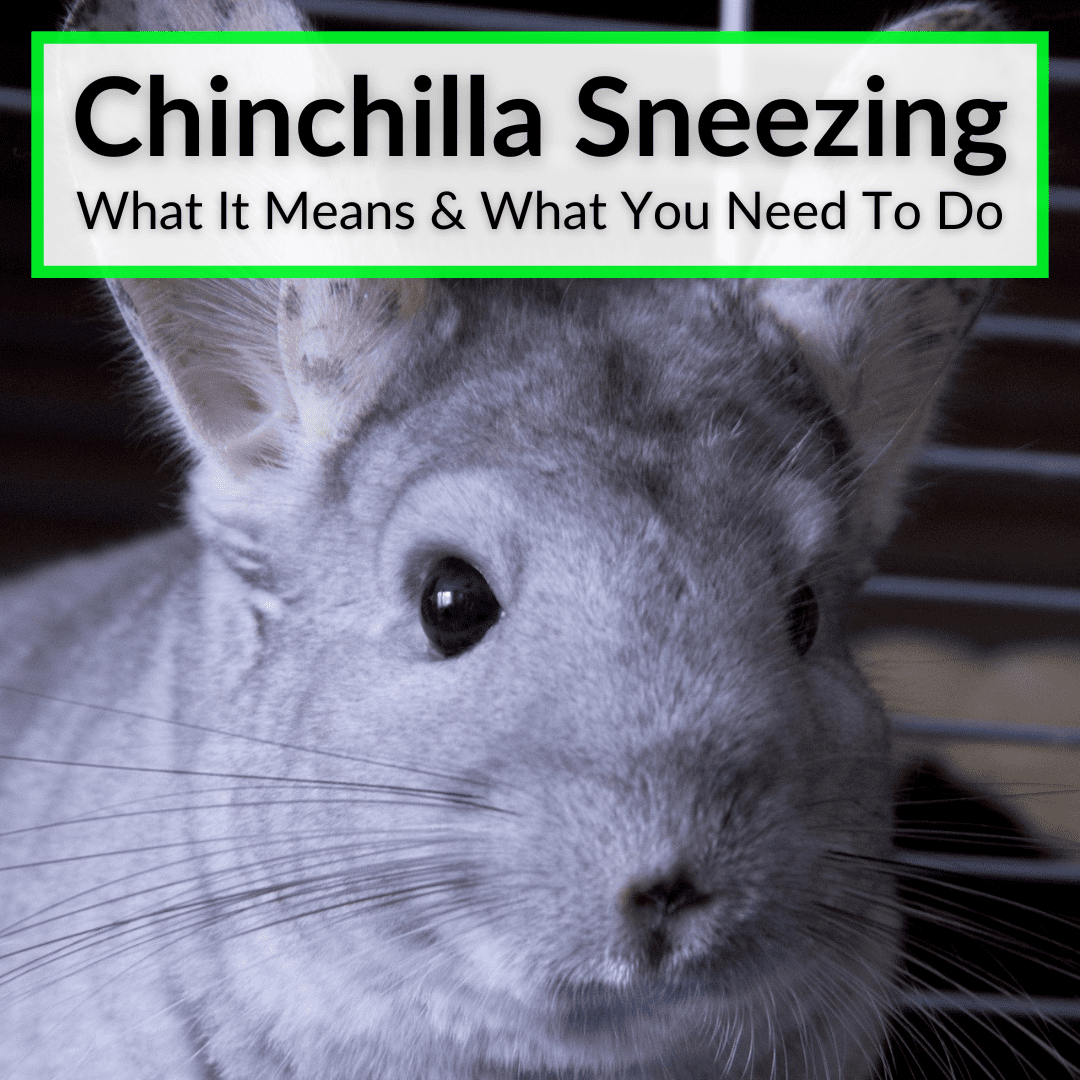
Just like anything else these cute little rodents do.
But it can also indicate a serious problem.
And even if it is not anything serious yet, small issues can turn serious quickly with such a small and delicate creature.
That is why you should always keep an eye out for any signs of illness and step in to deal with it quickly, if you notice anything out of the ordinary.
A few sneezes may not be anything serious most of the time. But if you ignore it and let it continue, you may wake up to find a motionless chinchilla in the cage in a day or two.
Keep reading to learn the most common causes of chinchillas sneezing, along with how to recognize each issue and what to do about it.
Contents
Chinchilla Sneezing
Chinchilla sneezing could indicate a respiratory infection. Continuous sneezing can also indicate pneumonia, which can be life-threatening in these small rodents.
Check your chinchilla for wheezing, labored breathing, nasal discharge, or eye discharge. Monitor your pet’s food intake and check its weight. If your pet does not eat for 12 hours or more, see your vet right away.
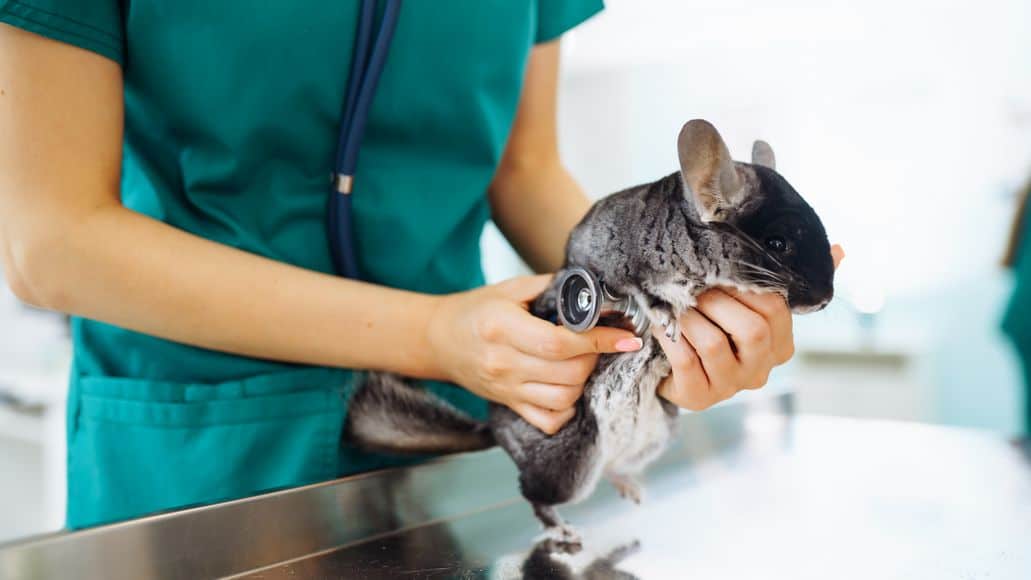
Let’s take a closer look at the most common causes of a chinchilla sneezing to help you determine why your pet is sneezing. We will also cover what you should do in each case.
Why Chinchillas Sneeze
The following are the most common causes of a chinchilla sneezing. If this does not help you figure out why your pet is sneezing, I suggest taking it to see a vet. Better to be safe than sorry.
Bacterial Infection And Pneumonia
Bacterial infections can result in a chinchilla sneezing frequently. Listen to your pet’s breathing. If it sounds labored, or if there is a sound of wheezing, along with a nasal discharge, please see your vet right away.
If left untreated, mild bacterial infections could turn into pneumonia, which can be fatal to chinchillas.
Your vet will take a swab of the nasal discharge to determine the bacteria causing the infection and prescribe antibiotics accordingly. Administer the medicine to your chinchilla according to instructions.
Many factors can cause respiratory infections and pneumonia in chinchillas including dirty cages or inadequate hygiene, poor diet, overcrowding in the cage, and improper humidity levels.
Allergies
In some cases, mild nasal irritation or allergies due to dust baths or hay could also cause your chinchilla to sneeze. It is important to monitor your chinchilla over the next few days.
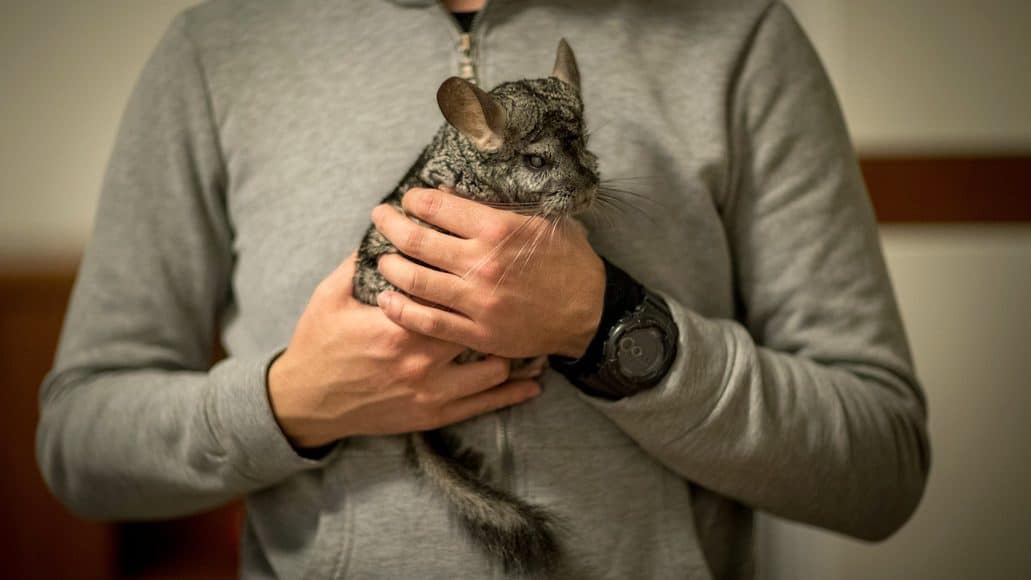
If there is a drop in your pet’s activity levels or if it is has not eaten for more than 12 hours, please see your vet.
Remember: simple allergies could become aggravated and turn into pneumonia, so do keep an eye on your pet. Make changes in your pet’s hay and dust bath (after consulting your vet) to prevent a recurrence.
Choking
Sometimes a chinchilla choking could be mistaken for wheezing or sneezing. A choking chinchilla might show additional symptoms like labored breathing, wheezing, excessive drooling, or gasping.
It might even paw at its mouth and attempt to vomit to remove the stuck foreign matter from its windpipe. If you think that your chinchilla is choking, please bring it to an emergency veterinarian right away. A chinchilla can not throw up and has no gag reflex, so it will need help.
Excess Humidity
Chins are native to the Andes where the climate is cool and dry. If there is excess humidity in your chinchilla’s environment, it could suffer from symptoms like difficulty breathing, nasal discharge, eye discharge, and a lack of appetite.
Prolonged exposure to such humid environments can also make your fur baby more susceptible to upper respiratory infections and pneumonia.
The relative humidity for chinchillas should be less than 60% (the ideal being 30% to 50%). If your chinchilla continues sneezing even though you have adjusted the humidity level, please see your vet immediately.
Overcrowding
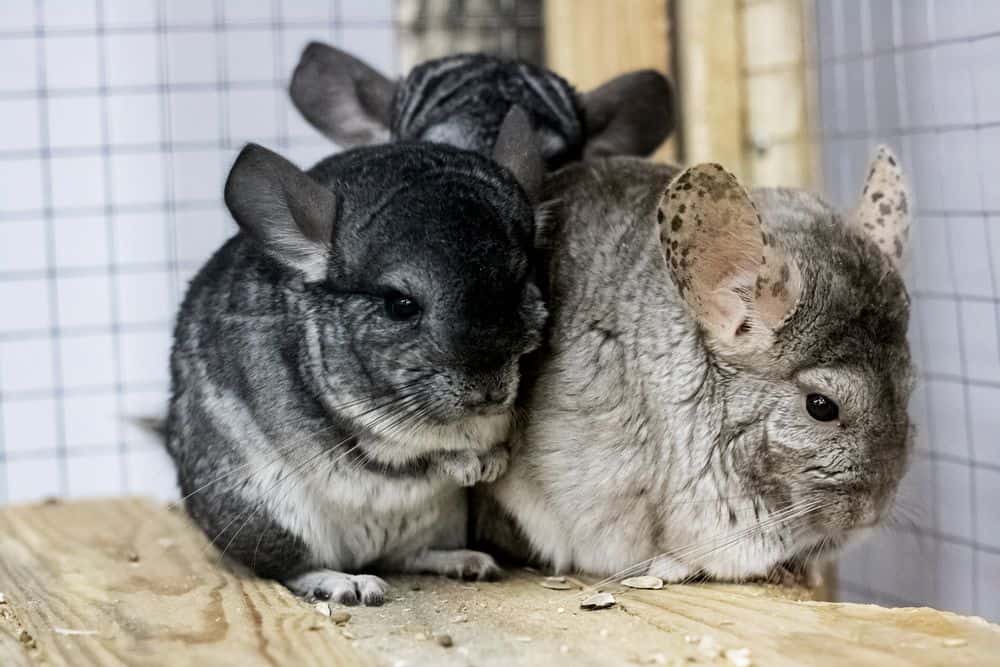
Chinchillas are not happy alone but you should not have too many chinchillas together in one cage. Every chinchilla needs a minimum of 4 by 4 by 3 of space, because they are extremely active animals and need to move a lot.
If you cram too many chinchillas in one cage, they could feel stressed or overwhelmed. This could cause labored breathing, gasping, etc. Overcrowding can also facilitate the spread of bacteria or diseases among all the chins.
Poor Immunity
Several factors can cause chinchillas to have poor immunity which, in turn, can result in respiratory infections. These include:
- Age: young chins generally have a weaker immune system. Similarly, old or senior chins could also be more susceptible to pneumonia or bacterial infections.
- Stress: stress can cause chinchillas to have a poor immune system. Overcrowding, dirty cages, bullying between animals, excess handling by humans, etc. can all result in stress for your little pet.
- Poor nutrition: dietary deficiencies or diets high in sugar can also result in a weakened immune system in chinchillas.
- Underlying health issues: a chinchilla with diabetes, impacted teeth, gastrointestinal issues, etc. could also have weak overall immunity.
Ask your vet to prescribe certain probiotic supplements to enhance your pet’s immunity.
What To Do If Chinchilla Sneezing Continues
Here are some steps to take when your chinchilla is sneezing:
- Use a warm compress to clean your pet’s nasal or eye discharge or crusts.
- Clean your pet’s cage thoroughly.
- Prevent overcrowding. If possible, invest in a bigger cage. This article reviews the best cages for chinchillas.
- Ensure optimum humidity. Use a dehumidifier to reduce excess humidity. In hot weather, use an AC or hose down the floor of your chin’s housing to cool it down. Use a fan to improve the ventilation.
I your pet continues sneezing despite these adjustments, or it becomes lethargic, and/or stops eating, then see your vet right away.
Administer any antibiotics or other medications as prescribed by the vet. You can also discuss adding a probiotic supplement to boost your pet’s immunity.
Do Chinchillas Get Sick Easily?
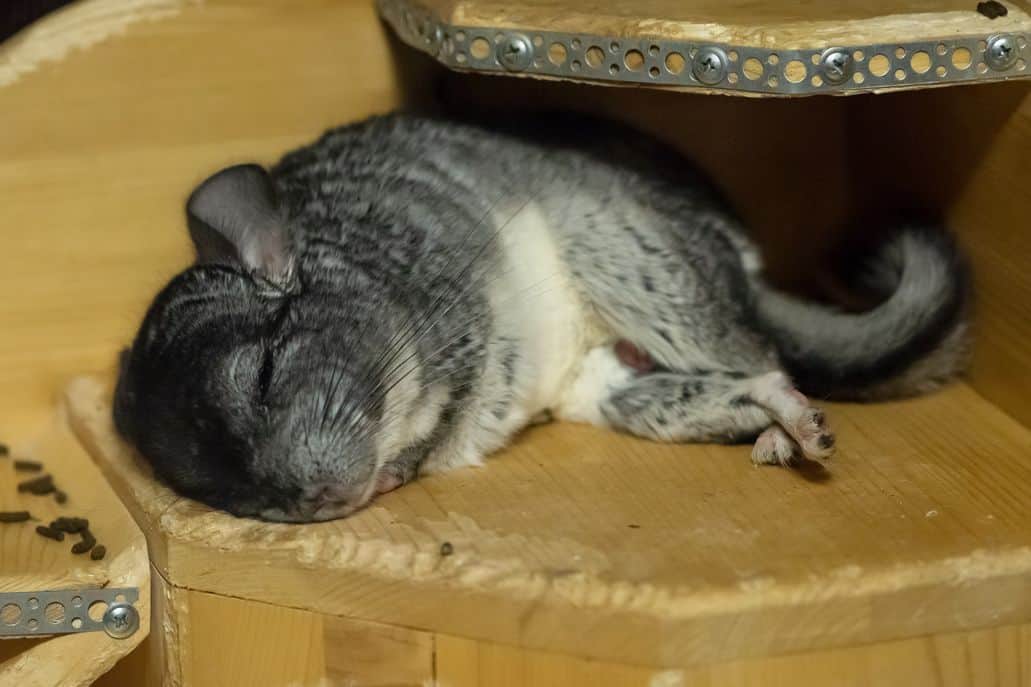
Well-cared-for, captive chinchillas are generally healthy and hardy animals. They are quite resilient when it comes to their health. However, if you do not look after them properly, chinchillas can be susceptible to various health issues.
Dental diseases or impacted teeth are especially common in chinchillas, particularly in pets that don’t get a high-fiber diet and a steady supply of good-quality hay.
Improper diet and inadequate water intake can also cause gastrointestinal issues in chinchillas.
Similarly, respiratory infections are also common in this species, particularly in chins kept in unhygienic environments or those exposed to cigarette smoke.
Skin infections like fur loss due to stress, or chewing fur, due to mites, lice, or other parasites can also affect chinchillas.
What Does A Sick Chinchilla Look Like?
Sick chinchillas may not always show any symptoms, since they are rather good at hiding their pain and illness. That is why you should always keep an eye out for any of the following changes in your pet:
- Lack of appetite
- Weight loss
- Inactivity
- Inability to jump or climb
- Hiding
- Hunched posture
- Increased aggression
- Nasal discharge
- Eye discharge or crustiness
- Excess water intake
- Diarrhea
- Constipation
- Fur loss
Consult your vet if you notice one, or more, of the above.
Do Chinchillas Like The Cold?
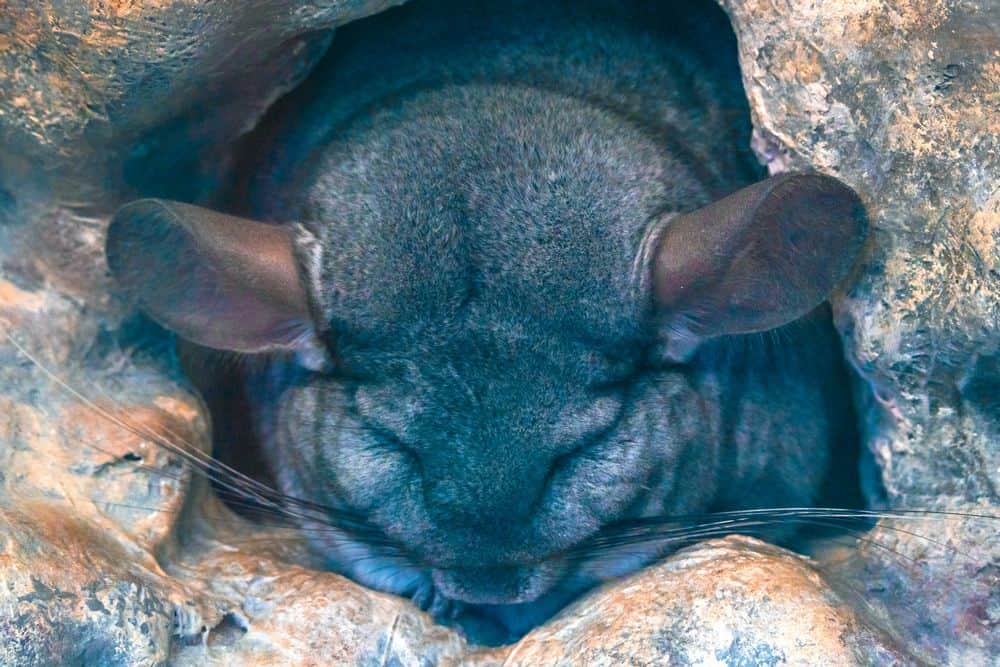
Chinchillas are native to the South American Andes where the weather is cool and dry. This is why they dislike hot weather and are sensitive to extreme heat. In summer, you must make every attempt to keep your chinchilla’s cage cool.
However, despite their thick fur, chinchillas do not like extremely cold weather either. Temperatures below freezing can be very uncomfortable for chinchillas. You may need to take steps to help your chinchilla stay warm in the winter.
If required, use a heater to increase the temperature to at least 60° F (16° C) in extreme winter and reduce the cold dampness. Ideally, you should keep your pet at temperatures between 60° and 74° F (16° to 23° C).
Chinchilla Sneezing: Final Thoughts
If your chinchilla is sneezing, it is probably not anything to worry about. Yet. As mentioned, things can take a turn for the worse quickly with these delicate rodents, so you want to deal with any potential issues right away.
Hopefully the list of common causes of chinchilla sneezing above has helped you figure out what is wrong with your pet. If not please take it to a vet to be safe.
Even if you know what is wrong, it is still best to go to a vet, unless it is something you know for sure you can handle. It is always better to be safe rather than sorry.
Leave a Reply